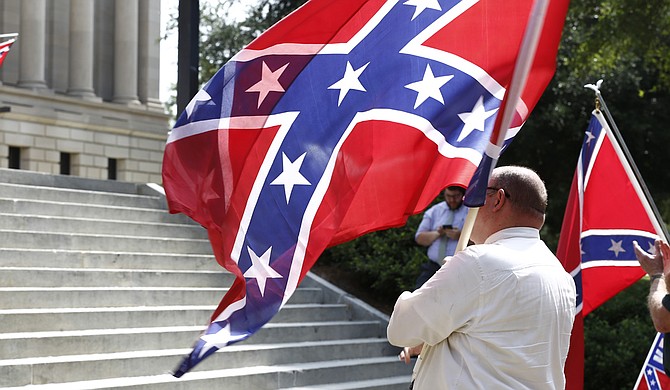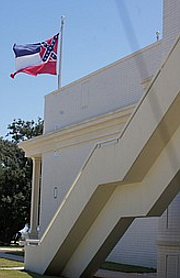Mississippi is the last state with a flag that includes the Confederate battle emblem—a red field topped by a blue X dotted with 13 white stars. Photo by Imani Khayyam.
Mississippians have attempted to change the state flag in several venues: ballot initiatives, lawsuits and petitioning lawmakers to pass legislation.
Mississippi Flag: A Symbol of Hate or Reconciliation?
The Mississippi Sons of Confederate Veterans are fighting hard to keep the state flag to honor the Confederacy. Others are fighting back.
So far, nothing has worked.
In the most recent state-flag news, U.S. District Judge Carlton Reeves dismissed a lawsuit filed by Grenada-based attorney Carlos Moore, who attempted to challenge the state flag based on his constitutional rights. We applaud his efforts, and while Moore's case did not have standing in Reeves' eyes, the veteran judge minced no words, giving perhaps one of the most eloquent-yet-succinct accounts of the state and Confederate battle flag's tainted, racist past.
"To millions of people, particularly African-Americans, the Confederate battle emblem is a symbol of the Old Mississippi—the Mississippi of slavery, lynchings, pain, and white supremacy," Reeves writes in his opinion.
"As Justice Fred Banks noted, the Confederate battle emblem 'takes no back seat to the Nazi Swastika' in its ability to provoke a visceral reaction. The emblem offends more than just African-Americans. Mississippians of all creeds and colors regard it as 'one of the most repulsive symbols of the past.'"
By press time, all but one public Mississippi university has officially decided to not fly the state flag, much to our governor's chagrin. After opening Donald J. Trump's Jackson campaign headquarters, Gov. Phil Bryant said he had a problem with Mississippi universities not observing the state law that demands similar respect for the state flag as for the flag of the United States. (Note: the law doesn't demand any public building to fly the state banner). In fact, several sectors, from public universities to religious organizations, choose not to fly the state flag. We are only embarrassing ourselves at this point—and running out of time.
If Mississippi is to have a less embarrassing state banner by the Bicentennial celebration, which is only a little more than a year away, something needs to happen quickly—whether through legislative action, a ballot initiative or another lawsuit. Judge Reeves did not shut the door on the judiciary avenue to change the flag, despite denying Moore's case.
"The Confederate battle emblem has no place in shaping a New Mississippi, and is better left retired to history. For that change to happen through the judiciary, however, the Confederate battle emblem must have caused a cognizable legal injury," Reeves writes. "In this case no such injury has been articulated. Whether that could be shown in a future case, or whether 'the people themselves' will act to change the state flag, remains to be seen."
As Reeves notes in his opinion, Mississippi was the second state to secede from the union—right behind South Carolina. It is long past the time for the state to follow South Carolina's lead yet again and bring down that flag. Our delays are only cementing our image on the wrong side of history for years to come. We do not want to see the current state flag raised over the new Civil Rights Museum next year, and to prevent that from happening, change needs to come quickly.
Read more about the battle over the Mississippi flag at jfp.ms/slavery.
More like this story
- State Flag Lawsuit Dismissed, But Judge Leaves Door Open for Future Case
- Miss. Lawyers: Don't Revive Lawsuit Over Confederate Emblem
- Judge: Is Court Proper Place for Mississippi Flag Debate?
- Confederate Emblem 'Anti-American,' Judge in Flag Case Says
- Hundreds Rally Against Confederate Sign on Mississippi Flag
More stories by this author
- EDITORIAL: Gov. Reeves Needs to Take ‘Essential’ Seriously for COVID-19 Social Distancing
- EDITORIAL: City Needs to Name Officers Who Shot Citizens Without Delay
- EDITORIAL: Free Press Is Not Here to Comfort the Powerful; We're Here for Truth
- EDITORIAL: Dear Mississippi Politicians, Criminal Justice Reform Is More Than Rhetoric
- EDITORIAL: Transparency in Officer Shootings Needs to Improve, Not Worsen





Comments
Use the comment form below to begin a discussion about this content.